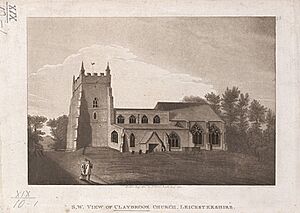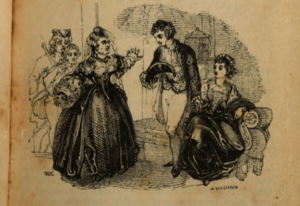Charles Jenner (writer) facts for kids
Quick facts for kids The Reverend Charles Jenner |
|
|---|---|
| Vicar of Claybrook | |
| Personal details | |
| Died | 11 May 1774 Claybrook, Leicestershire |
| Denomination | Anglican |
| Spouse |
Rebecca Thomson (m. 1764)
|
| Alma mater | Pembroke Hall, Cam. Sidney Sussex College, Cam. |
Charles Jenner (born 1736, died 1774) was an English writer, poet, and a church leader in the Anglican faith. He was known for his poems and his only novel, The Placid Man.
Contents
Early Life and Family
Charles Jenner was the oldest son of Charles Jenner and Mary Sawyer. His father was also a church leader. He held important positions like chaplain to King George II. His father faced some financial difficulties during his life.
Charles Jenner was baptised in London on May 1, 1736.
Education and Career
Charles Jenner began his studies at Pembroke Hall, Cambridge in 1753. He earned his first degree in 1757 and a master's degree in 1760. Later, he moved to Sidney Sussex College, Cambridge.
In 1769, Jenner became the vicar of Claybrooke Parva in Leicestershire. He also held a position at Craneford St. John in Northamptonshire. Unlike his father, Charles Jenner was careful with his money.
Interests and Personality
Jenner had a great love for music. He was known for his musical talent and enjoyed performing. People liked his company because he was kind and friendly. He even wrote and published a song called The Syren. His writings often showed his knowledge of music.
People described him as a gentle and polite person. He was also very caring and generous.
Later Life and Legacy
Charles Jenner passed away in Claybrook on May 11, 1774, at the age of 38. He became ill after a trip to London. A monument was placed in Claybrook church to remember him. Lady Craven wrote special verses for his memorial.
In 1764, he married Rebecca Thomson. They did not have any children.
His Writings
Jenner published his first book of poems in 1766. He won the Seatonian Prize at Cambridge twice. This prize was for poems about religious topics. His winning poems were about The Gift of Tongues and The Destruction of Nineveh.
Besides poetry, he wrote other types of books. In 1767, he published a collection of essays called Letters from Altamont to his Friend in the Country. He also released two volumes of various papers in 1771. These included two plays: Lucinda and The Man of Family.
In 1770, Jenner published his only novel, The Placid Man, or Memoirs of Sir Charles Beville. It became quite popular. In this novel, Jenner told the story from the point of view of a narrator who knew everything. This narrator not only shared the events but also commented on them.
After his novel, Jenner returned to writing poetry. He published another book of poems called Town Eclogues in 1772. He also wrote Louisa, a Tale, which included a poem dedicated to Lord Lyttelton.
 | Frances Mary Albrier |
 | Whitney Young |
 | Muhammad Ali |



